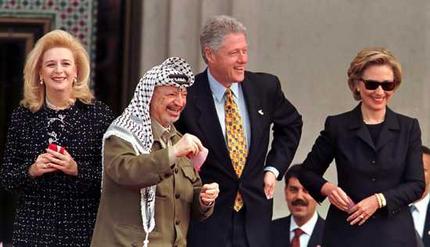ABC: Why is the Clinton Foundation taking money from companies with “serious human rights violations”?
 Oh, come on … is this a test? No, it’s actually a good question, and perhaps better that it’s former Clintonista George Stephanopoulos who had to front this segment on Good Morning America earlier today. A long awaited Clinton Foundation event in Morocco has finally begun, but questions about it have percolated for the last three months — especially about one of its sponsors. a big contributor to the foundation:
Oh, come on … is this a test? No, it’s actually a good question, and perhaps better that it’s former Clintonista George Stephanopoulos who had to front this segment on Good Morning America earlier today. A long awaited Clinton Foundation event in Morocco has finally begun, but questions about it have percolated for the last three months — especially about one of its sponsors. a big contributor to the foundation:
Former president Bill Clinton and the Clinton Foundation’s Global Initiative are being hosted this week at a five-star luxury hotel in Morocco by one of the world’s most controversial mining companies, criticized for “serious human rights violations” by the Robert F. Kennedy Center for Justice.
The Moroccan government-owned mining company OCP operates in disputed international territory in a remote part of the Saharan Desert and the firm has been criticized for removing the resources without adequately compensating the impoverished people who live there.
“Any time the human rights of a population are systematically suppressed in this type of way it’s a serious concern, and I think it’s worthy of attention,” said David McKean, who has studied the issue for the RFK center.
OCP kicked in a cool million for the event, where Bill Clinton hailed the corporation as “the Saudi Arabia of Phosphate.” That description might not play as well in the US, where Saudi Arabia is more well known for exerting cartel control over oil, as well as notorious human-rights issues regarding women [and homosexuals], two key constituencies for Hillary Clinton. In fact, Hillary’s name has disappeared from the roster since the exposure of the funding going into the event.
On top of this favor-currying, the company has begun spending a lot of money on lobbying in Washington. Even there, connections to Hillary Clinton’s proto-campaign emerge:
OCP, the records show, has paid Covington & Burling, a top Washington law firm, $1.3 million since 2012 to lobby the State Department and other federal agencies. The mining company’s CEO, Mostafa Terrab, who attended and was scheduled to speak at the Clinton Foundation event here, has also registered with the Justice Department as a foreign agent for Morocco to help “plan and prepare” meetings with Obama administration officials. One Moroccan government-backed entity last year also hired a firm headed by Washington lobbyist Justin Gray — putting his firm on a $25,000 a month retainer — the same month he was named a board member of the pro-Hillary Clinton super-PAC, Priorities USA. A spokesperson for Gray said the lobbyist had done previous work for the Moroccan government and that his current “engagement is not related in any way to [his] role with Priorities USA action.”
Coincidences? Don’t ask Bill Clinton — he just “works there”:
They may have to explain a few other people who work there too, Warner Todd Huston reports for Breitbart. According to the new book Clinton Cash, a few board members have decidedly checkered pasts:
The book shows that there are many problems with the Clinton charity. In fact, the Clinton Foundation is so unlike a real charity that even charity watchdog group Charity Navigatorrefuses to rate the Clinton Foundation because of its “atypical business model.”
One of those problems is the fact that the Clintons put big donors and close pals on the board for reasons that are hard to fathom. In fact, at least four of these “board members” have either been charged or convicted of serious financial irregularities, crimes including bribery and fraud.
The most well-known of these board members is Vinod Gupta.
“Vinod Gupta, the founder and chairman of the database firm InfoUSA, was a major Clinton financial supporter who served as a foundation trustee,” the book says.
In 2008 he was charged with fraud by the Securities and Exchange Commission (SEC) for using company funds to support his luxurious lifestyle. He was alleged to have used more than $9.5 million in corporate funds to pay for personal jet travel, millions for his yacht, personal credit card expenses, and the cost of twenty cars. He settled with the SEC for $4 million.
Gupta also paid Bill Clinton a $3 million “consulting fee,” an act of misuse of corporate funds that brought shareholders to file a suit against him. The company eventually settled with shareholders to the tune of $13 million, Clinton Cash reports.
Just how many more of these sleazy connections will emerge? It depends on whether the media keeps asking good questions.
